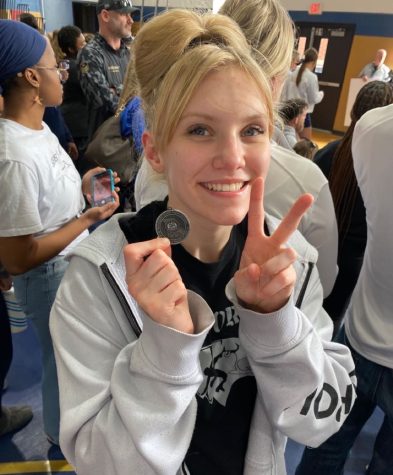Madeline Claravall
submitted by Madeline Claravall
Madeline Claravall (11) is proudly a Missouri State Thespian Officer (STO).
Junior Madeline Claravall is a talented performer with a passion for the arts, dazzling Liberty audiences in productions such as “Mamma Mia!” and “Charlotte’s Web.” However, it is her role as a Missouri State Thespian Officer (STO) that has brought her statewide recognition.
“Essentially, I am one of four members of the Student Board of the Missouri Thespians, a state chapter of the International Thespian Society,” Claravall explains.
Her main responsibility as an STO is to organize the annual Missouri Thespian State Conference. Collaborating with her fellow STOs, Claravall plans and leads performance and technical theater workshops, arranges professional-level performances and recruits guest speakers throughout the year.
She expresses, “Leading this non-profit organization gives me the humbling privilege of supporting/promoting performing arts all over the country, and more specifically, our state.”
Claravall’s journey as a leader has been shaped by her determination and resilience in the face of adversity. As a woman of color (WOC), she has faced criticism for her natural disposition and assertiveness. Yet, she has come to recognize that these traits have been critical to her success.
“I was always scolded for being too bossy, too controlling, or too opinionated, while others were commended for being obedient, staying quiet, and not asking too many questions.” Claravall details, “Now, I see that it is my bossy, controlling, opinionated character that has helped me become the successful leader that I am today.”
Claravall’s ability to recognize and embrace her strengths as a leader has not only propelled her forward but also serves as an inspiration to others. Through her leadership and example, she encourages other young women to embrace their own potential.
Her younger sister, Mallory, serves as her biggest source of inspiration. Although she has received unwavering support from numerous loved ones throughout her journey to leadership, it is Mallory who truly motivates her to be the best she can be.
Claravall describes her sister as “the coolest 10-year-old I know,” and admires her for being a kind, strong leader who is “wise beyond her years.” As Claravall explains, she sees herself as a role model for Mallory, and is constantly striving to set a positive example for her younger sibling.
“I know she looks to me for guidance and as an example, so, whether she knows it or not, she inspires me to be the best I can be, for her,” Claravall states.
Claravall’s experience as a female leader of color speaks to the systemic barriers that women face in gaining access to positions of power. As she notes, “Women – especially WOC – have historically been shunned from positions of power, or have had to work twice as hard as their male counterparts to reach the same level of success. Therefore, women and their opinions are often not represented in leadership roles at the same rate as men.”
However, Claravall believes that celebrating diversity and practicing inclusivity is essential to improving society. In her view, this means recognizing and acknowledging the contributions of women and other underrepresented groups, and taking active steps to amplify their voices and perspectives. As Claravall puts it, “Without different viewpoints, our world would become stagnant… so it is important to dedicate time to acknowledging how our mothers, daughters, sisters, and peers have made society into what it is today.”




